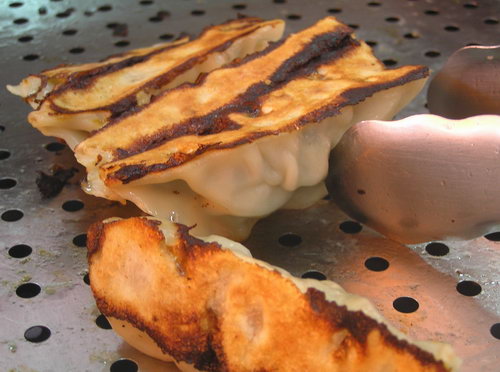Show me the Middle

Meanwhile, lets think about these numbers. Two elections in a row, the Greens get 386,000 votes. The KMT gets 361K followed by 378K, down from a peak of 383K in Kaohsiung. The so called "light blues" or "light greens" don't exist. There is no middle. There are no swing voters. There is no segment of the electorate that policy arguments have to impress -- on many policies, everyone already agrees. Why are politics in Taiwan so identity oriented? Because victory doesn't depend on moving toward the middle to grab the swing voters, the way it might in the US. Victory depends on the simple ability to mobilize one's own base. Thus, the question Bruce Jacobs asked in an excellent piece in today's Taipei Times is answered:I was reflecting on this in light of this old piece from the Straits Times of Singapore, 1998, after Ma won the Taipei mayoral election when a fellow Blue New Party candidate backed out and asked his supporters to vote for Ma. (Question: There are three Blue splinter parties that have cost the Blues a couple of major elections. Why do people keep admonishing the DPP for being split?). The reporter, the same Ching Cheong now wrongfully jailed in China, wrote:This being the case, why has Ma since then courted the far-right of conservative politics? Why has he tried to do deals with People First Party Chairman James Soong (宋楚瑜 ) and gain the small minority of Mainlander votes rather than going for the localist Taiwanese center?
Why can't Ma move toward the middle? Because there is no middle. Where could Ma go that he wouldn't leave his Deep Blue base behind?
The success of the ruling Kuomintang (KMT) in last Saturday’s three-in-one elections marks the end of ethnic politics in the island and the beginning of a New Taiwanese identity.This was the consensus among politicians, observers and the media after KMT’s Ma Ying-jeou won a hard-fought battle to wrest the Taipei seat from incumbent mayor Chen Shui-bian of the opposition Democratic Progressive Party (DPP).
Yesterday, Mr Ma said his victory signified the end of an ethnic rift that has marked Taiwan’s politics over the past five decades.
The victory of Ma Ying-jeou is an important symbol and a new milestone of ethnic integration. I hope all ethnic issues will become a part of history and will not continue to haunt the people of Taipei,he told a press conference yesterday. He garnered 51.13 per cent of the vote as compared with the 25.89 per cent his party took in the last mayoral race in 1994.
Anyone remember where the New Taiwanese identity went? Into the same dustbin as the APROC plan, I think. The whole idea of a Taiwan centered identity carries with it the idea that people are going to vote for the party that will take the best care of Taiwan. Is this really the case? Let's check out those numbers....
..........Taipei Mayoral Elections
Year.................Blue.................Green
1994.................56%..................43%
1998.................51%..................46%
2002................64%..................36%
2006................53%..................40%
When you look at the last four elections, the Taipei mayor elections all show a similar pattern of Blues at 50-55% and Greens at 40-45%. The only exception was 2002, when turnout was somewhat below the usual 1.4 million figure. Where are the swing voters? Did Ma's popularity hinge on his brilliant guidance of Taipei, or the constant drumbeat of positive publicity the pro-Blue media hands him, as well as his good looks? I doubt anyone out there would argue that policy was the issue in the 2002 mayoral election.
On Dec 18 the Taipei Times hosted an excellent commentary on the Kaohsiung elections. In addition to hacking on the local media for their inane interpretations of the elections, the author submitted some very interesting statistics, arguing that Taiwan does have swing votes.
In the Kaohsiung city councilor elections, the total vote counts for the KMT, the People First Party and the New Party constituted 42.76 percent of total votes, a figure that shows that the pan-blue camp enjoys massive support in the city.
By contrast, the percentage of city councilor votes for DPP and the Taiwan Solidarity Union candidates only came up to 36.23 percent, a figure well below that of the pan-blue camp. It is worth noting that 21.01 percent of voters voted for independent city councilor candidates, which indicates that the Kaohsiung electorate is composed of a substantial proportion of undecided swing voters.
Does the election of "independent" candidates really imply the existence of swing voters as we know them in the US? I would argue that it does not.
First, "independents" in Taiwan tend to be pro-KMT in practice. Second, and more importantly, there is a major disconnect between how people vote at different levels of government. In our area there is a mix of DPP and KMT people at different levels -- our village chief is KMT, but our neighborhood chief is DPP. Why? Because people at the local level tend to vote by personal affiliations such as clan and business links -- how well do I know this guy, and how? Party loyalties are not so strong. I suppose one could argue that this is a "swing voter" but the "swing" does not occur because someone offers better policies or a better vision of the future.
Despite the Blue/Green divide over identity, I would argue that the parties are insufficiently differentiated from one another across a wide range of policy issues. No major party is out there arguing that the National Health Insurance system be abolished, for example. No major party is arguing for the fundamental changes in environmental policy that will be needed to clean the island up. No major party is arguing for change in the government-business relationship. No major party has a concrete plan to solve income inequality. No major party is fighting for organized labor. Both the KMT and DPP are center-right nationalist parties, one pro-China, the other pro-Taiwan.
Taiwan voters, I suspect, "swing" because they are following a crude version of the decision strategy known as "Take the Best." For example, in selecting a mate, if one values brains more than beauty, then if one has to choose between two potential mates, the smarter one will get the nod. If two candidates are equal in both brains and beauty, then choose randomly, because it doesn't matter.
Since in any election major opposing candidates offer little deviance from the parameters of public policy as established in Taiwan, voters have to fall back on their personal affiliations with the candidate. Essentially, they have to choose randomly since candidates are more or less the same. Naturally, for the higher offices where voters are unlikely to have interacted with a candidate, they go with their identity. At lower level offices, where voters might personally be connected to a candidate, they go with their personal connections.
Thus, I would argue, there are no 'swing' voters in Taiwan. What we are looking at is votes slowly finding an equilibrium over time -- across several elections -- and settling into predictable patterns at the national level, and unpredictable ones at the local level.
Note also another emerging pattern -- the smaller parties are getting creamed. The PFP lost 4 of 6 seats in Taipei, and 3 of 7 in Kaohsiung. The TSU took 2 seats in Taipei and only 1 in Kaohsiung. The conventional wisdom is that in 2007, when the Legislature shrinks to 113 seats, these parties will disappear at the national level. I see no reason not to believe that at the moment.
[Taiwan] [Ma Ying-jeou] [Chen Shui-bian][Kaohsiung] [Taipei] [DPP] [KMT] [PFP] [TSU]
















9 Comments:
Waisheng are much more dogmatic in their voting than bensheng. Kaohsiung was a fiercely competitive election, KMT's Huang Jun-Ying just didn't know it.
On the other hand, Taipei, everyone now thinks DPP's Frank Hsieh is a god for losing to his KMT opponent by over 10 percentage points. In the US, you'd be incredulous about that kind of interpretation.
I don't think you're right about the lack of swing voters. My personal experience is that the DPP has lost quite a bit of moderate support. The question is, has the KMT gained it? Given that they still are dirty as fuck and Ma Ying-jeou has proven himself weak and a poor administrator with neither centrist views nor solid control of his base...
Anyways, actually prior to this year, Ma appealed to a lot of the light green, and actually, I think light green are really the key. If absolutely EVERYONE came out to vote and voted their political leaning without the impact of a recent scandal or looking at the candidate, I think the DPP would win hands down. However, I also believe that a lot of this light green is apathetic--they don't think the DPP is so great that they would vote most of the time, but they aren't about to vote for the KMT.
Your bases always vote for you. You don't need to pander. They're old or they are waisheng and they will vote every time. Light green really needs to be voted to vote, but they aren't going to vote for you if you are extremist.
This has been a little random, but let me sum up. There are three groups I see:
1) deep Blue
2) deep Green
3) light Green
I doubt the existence of light blue. The idea I'm trying to capture is that Blue is easy to capture as a block, but Green consists of moderates and extremists. So it's fairly hard to get a cohesive group out of them. The center is there, it's just that they are hard to get.
Michael, those aren't just "the last four elections" for Taipei mayor -- they are the only four elections ever held for that position. Before 1994, the mayors were appointed by the then-unelected president.
The anonymous commenter above wrote that "Green consists of moderates and extremists." Why, in your opinion, are they "extremists," and can you give any examples of what you mean by this?
Tim Maddog
Besides the threat of the PFP party siding with the dpp in regards to the asset issue, I wonder why Ma never played hardball with the PFP'ers. Long ago, he should have issued an ultimatum: join now or never. Since most are career politicians and have no other future, it would have been a smart move on Ma's part to rid himself of the soong tumor. Why Soong has any power left is a mystery. Does he hold the key to some safe deposit box that the KMT wants back (ChungHsing bills finance)? Does it have anything to do the lafeyette payoff (of course he does, but I mean what dark blue does he have dirt on that can still get burned?) Did he buy property in China with KMT money and holds the deeds? What is it that gives me power?
As far as light blues goes, its a group full of collective ammesia. they ignore the past becuase they just dont care. (parents are blue, they vote blue because they just dont know the truth about what went on 20-30 years ago). "life was good when CCK was president...."
Anonymous, that's a very interesting analysis. I shall think upon it.
Michael
There are many people in Taiwan that support a politically independent Taiwan and economic integration with China simultaneously. This means graded but immediate lifting of investment in China, three links, Chinese tourists in Taiwan, etc. This is what I mean by moderates.
Dreaming about a new constitution (come on, the ROC is thankfully very different from Republican China, 1912-1949, and there is absolutely NO equivalence between the two no matter what deep-Blue tells you... reforms are the way to go) or battling over Tongyong Pinyin (see pinyin.info for discussion) is absolutely not something moderate green supports. These people are deep green.
Deep greens are somewhat blind to the stupidity of the economic impediments that Taiwan has setup. Read about what Carlyle group did. They took Taiwanese money, borrowed from Taiwanese banks, to take 日月光 private and they are going to walk straight through the 40% investment barrier. Why? Because they are an "American" or at least non-Taiwanese company. But the whole point was to stop Taiwanese capital from flowing to China and it's going there anyways!!!
There is a lot of room for cooperation between China and Taiwan and not all of it is about national security. Some of the brighest students in China would trip over themselves to study in Taiwan. This is the reality of sharing a common language and geographical proximity. Last time I checked, Canada still refuses to become the U.S.'s 51st state.
It's hard to say what economic integration does to Taiwan's security because China is highly, highly invested in peace and stability as well. But you can't setup these barriers successfully unless you shut out every other country as well, and Taiwan can't afford to do that. The economic reality is not unknown to DPP legislators, but some are beholden to deep-Green that ideologically does not want to see economic integration between the two countries. There are also deep Blue that hope economic integration will lead to political integration, but can the DPP not be lead around by Han-chauvinist idiots? Doing the opposite of the KMT is not always right.
If Taiwan were something like a politically neutral, reputable, financial capital, Taiwan would only have even more leverage over China and people would only have more interest in the continued openness, independence, and security of the island.
The good news is that Su Tsen-chang is very clearly light green and if he has his way, we'll see loosened investment rules, cargo and people movement soon.
Great discussion, guys. Many thanks.
The "moderates" are only moderates on the China issue -- the real issue is not whether Taiwanese agree on economic integration and political independence, but whether the Chinese will.
Michael
To the last anonymous:
Deep greens are somewhat blind to the stupidity of the economic impediments that Taiwan has setup. Read about what Carlyle group did. They took Taiwanese money, borrowed from Taiwanese banks, to take 日月光 private and they are going to walk straight through the 40% investment barrier. Why? Because they are an "American" or at least non-Taiwanese company. But the whole point was to stop Taiwanese capital from flowing to China and it's going there anyways!!!
Because someone can find some way to bypass the impediments, so we might as well lift the impediments totally? Your example demonstrates a funny way of thinking. It's like when you see a dam has a leak, instead of fixing the leak you suggest to knock down the dam entirely simply because "it's leaking anyway". You even concluded that whoever wants to keep the dam and fixing the leak is "blind to the stupidity of keeping the dam." Don't you think your suggestion of "knocking down the dam because it leaks" fits the description of stupidity even more ?
There is a lot of room for cooperation between China and Taiwan and not all of it is about national security.
It's hard to say what economic integration does to Taiwan's security because China is highly, highly invested in peace and stability as well.
Yes the security is critical to Taiwan's survival but it's not the only issue between Taiwan and China.
I've been to some China towns in USA and they are always the dirtest area in the city. Japan was considering to block Chinese immigrants entirely because Chinese immigrants, legal or illegal, simply don't obey and respect the law and have become the source of significantly increasing crime rate. Chinese culture (at least, at the current stage) is a virus to humen society. An uncontrolled opening to chinese immigrants will turn the society into shit in a short time. This is not a myth, it's already happened and is still happening in many countries. Pro-green netters from Taipei have noticed that the amount of poorly dressed bums on the street have increased significantly in recent years. They often spoke in a non-Taiwanese tones, and with manners not commonly seen in Taiwanese (for example, spit in public area as they wish).
USA is a country that's large enough to serve as an effective buffer so some local area that is infected with Chinese immigrants doesn't matter. Japan is a country that's relatively larger than Taiwan too. They can afford sharing some Chinese dark side and still manage well. But not Taiwan. Taiwan is too small, and is crowded with her own people already. An uncontrolled opening between Taiwan and China will cause huge amount of Chinese immigrants rushing into Taiwan to loot resources (just like what they did in the pre-228 days), or take whatever advantages that Taiwanese fought hard to earn in the past decades.
This is already happening in Hong Kong. Chinese females rush to HK to deliver their babies, because whoever born in HK becomes a HK citizen who can share the benefits paid by all HK citizens. HK citizens already stand out to protect.
but can the DPP not be lead around by Han-chauvinist idiots? Doing the opposite of the KMT is not always right.
May I remind you, the blocking between China and Taiwan was Lee Teng-Hui's policy when he was KMT president. What DPP actually did after 2000 was lifting that blocking to some extent. They have been going from "total blocking" toward more opening direction. Your labeling DPP with "doing the opposite of the KMT" is not true.
The issue of economic is important but not the only one. There are reasons that LTH has to put the block there. You simply single out the economic issue, and ignore all others. A country can not be run like that.
The good news is that Su Tsen-chang is very clearly light green and if he has his way, we'll see loosened investment rules, cargo and people movement soon.
Simply because Su tends to single out the economics issue and ignore all others, like what you did here, I'll never support him. Many pan-green supporters won't either. That would mean, he has only slim chance to get nominated by pan-greeners.
Taiwan Echo, you're not fully understand the implications of the investment barrier. It's not a matter of whether it leaks or not; it's a matter of profit, pure and simple.
Since pot is so popular in the news these days, I'll use pot as an example. A pot dealer might be able to buy a gram for $10 a gram. He will turn around and sell it to you for $50 a gram. You know it's only costing him $10. You continue to buy from him. Why? Because it's fairly safe to buy from him; he's willing to run a real risk of running into cops whereas the transaction between the two of you is fairly riskless.
ASR wants to invest in China. It can't do this directly because it's not allowed to. Carlyle, as a non-Taiwanese entity, can. Carlyle is going to charge you so that you can invest in China. An investment that originally could have been financed directly by Taiwanese capital (Taiwanese buying stocks, bonds, or Taiwanese banks financing the investment) now has to pass through Carlyle's hands. Taiwan's banks know that Carlyle is going to take the money that they are loaning to them and make a shitload of money. They know they are capable of doing exactly the same financing. But they give it to Carlyle anyways, because they're not allowed to do the investment that Carlyle will do. Carlyle takes its cut, and its margins very likely will be something like the pot deal, especially if it takes ASR public in a market like the US where price/earnings is much higher than in Taiwan.
This law just makes non-Taiwanese richer off of what would've been Taiwanese profit. It doesn't and can't prevent outflow of capital to China in the long-term.
The last anonymous (assuming you are the last last anonymous):
It's not a matter of whether it leaks or not; it's a matter of profit, pure and simple.
I used the leaky dam analog to show how funny your thought is, because you were the one who used the Carlyle case as example and said:
"But the whole point was to stop Taiwanese capital from flowing to China and it's going there anyways"
which sounded like it IS a matter of whether it leaks or not.
I may not understand what the investment barrier means to you. However, this really isn't the point. I have already stressed that $$$ is not the only thing at stake here. Whoever on the President post has to to worry all aspects of a country, but not just if some businessmen earn or lose money.
This law just makes non-Taiwanese richer off of what would've been Taiwanese profit. It doesn't and can't prevent outflow of capital to China in the long-term.
The law might not be perfect, but it's there for a reason that is obviously beyond your compreshension, otherwise you would have suggested a fix, but not linked it to political ideology and used that to attack DPP.
Being independent or not, Taiwan has to keep some distance from China. It's not a political issue but a reality of life and death, as well as keeping whatever fruits Taiwanese fought so hard to harvest during the past decades. You people just don't get it. Taiwan is so small in size, whatever Taiwan has will be diluted by China quickly if no distance is kept. This is NOT a political issue.
Or, maybe you guys did get it but don't care. I can't tell.
Post a Comment
<< Home